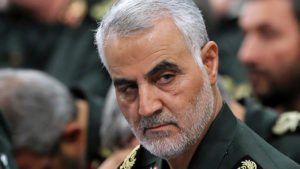As expected, and very cleanly and clearly. No attempt to obfuscate:
At least two airbases housing US troops in Iraq have been hit by more than a dozen ballistic missiles, according to the US Department of Defence.
Iranian state TV says the attack is a retaliation after the country’s top commander Qasem Soleimani was killed in a drone strike in Baghdad, on the orders of US President Donald Trump.
 As I noted when Iran general (and war hero) Qasem Soleimani was assassinated, Iran pretty much had to retaliate.
As I noted when Iran general (and war hero) Qasem Soleimani was assassinated, Iran pretty much had to retaliate.
Soleimani was effectively the most powerful General in Iran. Think of him as a combination of Eisenhower and someone who fought on the front lines: to Iranians, a genuine hero. The man who actually was most responsible for defeating ISIS, among other things.
You could regard him as the second most important man in Iraq.
If the US could kill him without consequences, no one in Iran’s leadership was safe, except possibly Khameini (the Supreme Leader) and maybe not even him.
Retaliating is a matter of personal survival for Iran’s leadership. Personal.
But Soleimani was also tremendously popular. So, as often happens when attacked by outsiders, even Iranians who dislike the Iranian regime have rallied around. (Americans may remember something similar after 9/11.)
I note that Iran has retaliated by hitting military targets. Which is to say: The US killed someone in their military, they have retaliated by attacking the US military. I would say that this is legitimate.
Only bullies think that their victims are obligated to sit still while being hit and not punch back. Oh, and a lot of Americans.
Trump threatened that if Iran retaliated he would hit multiple targets, including cultural ones. Iran has said that if he does so they will escalate, including hitting Israel and Dubai.
What they are trying to indicate is that they are not going to be Iraq. It isn’t going to be some nice clean war where the victim sits still while bombed to shit by US forces and only a few American soldiers die, which no one actually cares about who matters. (No, no, don’t pretend that American leaders actually care about American casualties, their actions indicate they do not and you’ll look like an idiot and a fool.)
Remember that Iran is an ally of both Russia and China. China needs Iran in order to complete its Belt and Road Initiative (the centerpiece of both their economic and alliance strategy and Xi Jinping’s signature policy, upon which his legacy rests). Russia is run by Putin, who has made not allowing the US to destroy any more Russian allies the centerpiece of his foreign policy. It’s why he went into Syria, and it’s why he hates Hilary Clinton so much, as he regarded her as the prime US actor in destroying Libya.
So this war has a real chance of serious escalation. Iraq was isolated and had no friends. Iran is somewhat isolated, yes, but it does have powerful friends who believe it is in their self-interest to keep Iran from being blown into failed state status by the US.
Again, the logic here is the same as Iran’s as regards escalation: If Russia (and China) let the US take out their allies whenever the US wants, then what is to stop the US from just doing that until these countries have no allies left?
This is a dangerous moment, and the US is not in the right here. The US unilaterally caused this problem by assassinating a senior government official. All the whinging on about how Soleimani has been involved in Iranian proxy attacks on the US is ludicrous: The official US policy is to fund and aid terrorists attacking Iran (look it up.) US officials, certainly including every President since Bush, have made decisions leading to the deaths of hundreds of thousands of civilians and other countries’ military personnel.
This is realpolitik, not some morality play. There are no good guys here, there are just people who are acting on orders or in what they think are the interests of their country. (Or, in Trump’s case, his own interests.)
The correct action right now is to not escalate again. Escalation will lead to a lot of dead people, for no gain for either Iran or the US.
Note that I despise Iran’s regime. I am a left-winger who believes in the equality of men and women, kindness and universal humanity, not in theocratic government. If Iran’s government were to fall tomorrow, I’d be OK with that.
But that’s internal Iranian business. It’s not America’s business to start a war with Iran. It will not make anything better, any more than attacking Iraq did, or attacking Libya (which now has its famous open air slave markets).
It should also be noted that, if the war happens, the Europeans are going to get slammed with another bunch of refugees. Perhaps they should pre-empt this by sending some troops to Tehran, so that if Trump attacks, he has to kill Germans and French.
Kidding, kidding. I know that the EU has no actual morals and not enough guts to do this. But, y’know, in an alternate universe where they actually had the bravery to stand up to the US either in their own interests, or in something approaching a desire to do the right thing…
We’ll see how this plays out.
But remember, Iran isn’t planning on sitting still and taking it. This isn’t going to be Iraq of Afghanistan. If this turns into a real war, they will hit back with everything they have, rather than hoping that if they just lie there and let the US kick them, the US will stop before kicking them to death.
And China and (especially) Russia don’t want them kicked to death.
Money would be rather useful, as I don’t get paid by the piece. If you want to support my writing, please DONATE or SUBSCRIBE.

 As you’d expect from the title, both more and less than it seems.
As you’d expect from the title, both more and less than it seems.